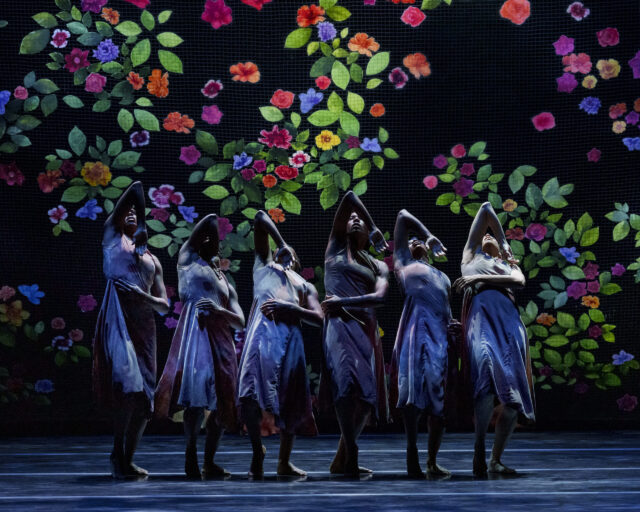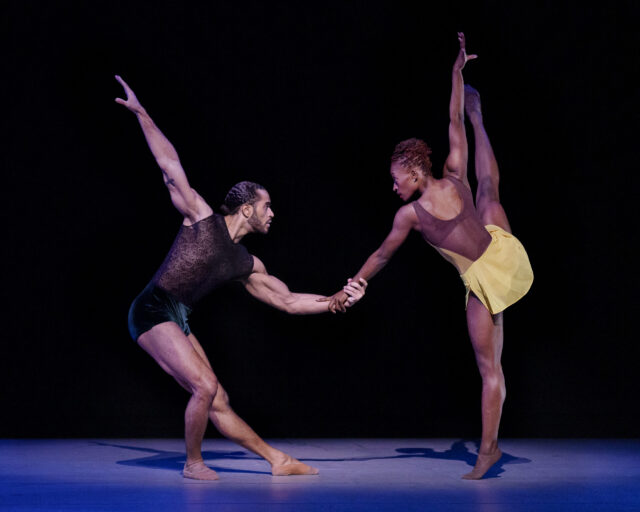
Jamar Roberts’s Ode is a meditation on gun violence (photo by Paul Kolnik)
ALVIN AILEY AMERICAN DANCE THEATER
BAM Howard Gilman Opera House
30 Lafayette Ave. between Ashland Pl. & St. Felix St.
June 4-9, $37-$105
718-636-4100
www.bam.org
If you missed Alvin Ailey American Dance Theater’s annual monthlong visit to City Center this past November/December, you can still catch two programs from their sixty-fifth anniversary season, taking place at BAM’s Howard Gilman Opera House June 4-9. Alvin Ailey had close ties to BAM, dancing there in 1956 and starting a company residency in 1969.
“Contemporary Visions” consists of new productions of Jamar Roberts’s 2019 Ode, Hans van Manen’s 1997 Solo, and Alonzo King’s 2000 Following the Subtle Current Upstream. Set to Don Pullen’s “Suite (Sweet) Malcolm (Part 1 Memories and Gunshots),” Ode is a seventeen-minute meditation on gun violence, restaged by Ghrai Devore-Stokes. Solo, originally performed by the company in 2005 and restaged by Clifton Brown and Rachel Beaujean, is seven minutes of playful one-upmanship as three male dancers strut their stuff in a kind of dance-off, their costumes (by Keso Dekker) differentiated by yellow, orange, and red; as each finishes a solo, they make gestures and eye movements inviting the next dancer to top what they have just done. But this is no mere rap battle; instead, it’s set to Sigiswald Kuijken’s versions of Johann Sebastian Bach’s “Partita for Solo Violin No. 1 in B minor, BWV 1002 — Double: Presto” and “Partita for Solo Violin No. 1 in B minor, BWV 1002 — Double: Corrente.”

Alonzo King’s Following the Subtle Current Upstream is part of “Contemporary Visions” Ailey program at BAM (photo by Paul Kolnik)
And Following the Subtle Current Upstream, which King calls “a piece about how to return to joy,” is a twenty-two-minute work that unfolds in a series of vignettes with nine dancers performing to silence, a storm, chiming bells, and other sounds by Indian percussionist Zakir Hussain, American electronics composer Miguel Frasconi, and the late South African singer and activist Miriam Makeba. At one point a dancer is alone onstage, like a music box ballerina, two horizontal beams of smoky light overhead; the lighting is by Al Crawford based on Axel Morgenthaler’s original design, with tight-fitting, short costumes by Robert Rosenwasser, the men in all black, the women in black and/or yellow.
“All Ailey” is a treat for company aficionados, with presentations of the Ailey classics Memoria (1979), A Song for You (1972), Cry (1971), and Revelations (1960). Memoria, which will be performed with members of Ailey II and students from the Ailey School, was inspired by the death of Ailey’s friend and colleague Joyce Trisler; it is set to music by Keith Jarrett. A Song for You, an excerpt from Love Songs, features Donny Hathaway’s version of Leon Russell’s title track. Ailey choreographed the seventeen-minute Cry as a birthday gift for his mother. And Revelations is, well Revelations, one of the most famous and important dance works of all time.
[Mark Rifkin is a Brooklyn-born, Manhattan-based writer and editor; you can follow him on Substack here.]